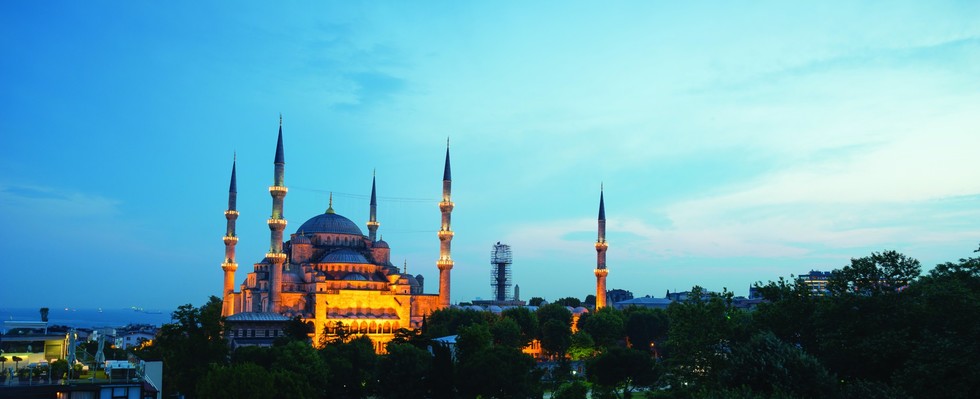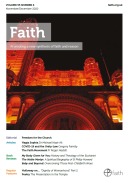Hagia Sophia
Dr Michael Nazir-Ali tells the story of Hagia Sophia and recent tragic events in Turkey
Since the attempted coup d’etat, and the large scale purges which followed, Turkey has been burnishing its Islamic credentials. With any realistic prospect of joining the European Union gone, it has been turning away from its Kemalist secularism and towards its Islamic glory days. It is seeking also to promote a kind of populist Islamism both within Turkey and, more widely, in the Islamic world, in countries such as Pakistan and Malaysia.
The (re) conversion of the famous Hagia Sophia into a mosque is part of this process of Islamisation.
Cathedral
The history of the great cathedral dates back to 360AD when it was founded by Constantine’s son Constantius II. As such, it is one of the oldest churches in Christendom, going back to before the many unhappy divisions in the Christian family. It bears, therefore, an ecumenical witness to our own age in a unique way. During its long life it has under-gone many vicissitudes: it has been burnt down by rioters, occupied and sacked by invaders and then turned into a mosque by the Turkish Ghazi (or fighter in the name of Islam), Mehmed II when Constantinople fell, at last, to the Turks in 1453 and the city was renamed Islamople or Istanbul. And so it remained until, in 1934, in recognition of its iconic civilisational status, the secularists declared it a museum open to people of all faiths and none. It is this identity which is now being threatened by Islamist pressure.
The Fate of Other Churches
In this last misfortune to befall the building, it has shared the fate of most of the other churches of the city, not only at the time of the conquest but throughout the history of the Ottoman Empire. (Constantine’s Hagia Eirene, dedicated to Christ the Prince of Peace, for example, became an arsenal!). Many other churches, in the Ottoman domains, were similarly converted into mosques, following the pattern of the early conversions such as that of the Cathedral of St John the Baptist (supposed to contain the relic of the Baptist’s head) into the Umayyad Mosque in Damascus. These conversions are all the more remarkable because Shari’a provides for the retention of their places of worship by conquered ‘People of the Book’, that is Jews and Christians and later, by extension, Zoroastrians. They could continue to use them for worship but they could not display any sign of their faith on the exteriors of these buildings, they could not ring bells to call people to worship and they had to seek permission from the Muslim authorities to repair them. They were forbidden to build new places of worship, though, in fact, from time to time, even this did happen.
The Qur’animplies that there is divine providence in the preservation of monasteries, churches and synagogues from the depredations of ag-gressors (22:40).The second Caliph, Umar, when he went to receive the surrender of Jerusalem to the Muslims in 636AD, was invited by the Patriarch Sophronius to pray in the Church of the Holy Sepulchre. He refused to do so on the grounds that if he did, the Muslims would
use it as an excuse to turn the church into a mosque. In spite then of the teaching of the Qur’an and the Sunnah (or practice) of the first Caliphs, churches, temples and other places of worship were either destroyed or converted into mosques.
Freedom
Muslims and others often defend the actions of the Turkish state and other nations by pointing out that, after the Reconquista in Spain, famous mosques, like the ones in Córdoba and Seville, were either turned into churches or destroyed. In Córdoba, there had been a church on the site of which the mosque was built but in Seville there seems to be no evidence that the AlMohad mosque, on the remains of which the present cathedral stands, was itself constructed where a church had been. We need to keep two things in mind here: First, the Christian population of Spain remained unwilling subjects of Islamic rule during the whole period of Muslim ascendancy and Muslim rulers were unable to convert the majority to Islam, as happened, over the centuries, in the Middle East. Secondly, what may have happened in the Middle Ages does not provide justification for similar actions today.
We live now in times when freedom of religion and belief is widely recognised and protected both by international and national law.
No mosques are being turned into churches today and were anyone to attempt such a foolhardy action, it would attract widespread condemnation from Christians themselves. As a matter of fact, our own times are characterised by significant mosque building in traditionally Christian countries in Europe, America, Asia and Africa, often supported by Christians on the grounds that Muslims, like others, should be free to practise their faith.
Reciprocal Generosity?
For many, it is not unreasonable to expect some reciprocal generosity from the Muslim side but, at best, it has been half-hearted and, at worst, non existent. One of the worrying aspects of the reconversion of Hagia Sophia into a mosque has been the warnings that Mr Erdogan and others have been issuing to those countries where Muslims believe mosques have been destroyed or turned into places of worship for other faiths or where they are under pressure from people of other faiths. Such areas stretch from the Iberian Peninsula to Israel to India and the Philippines. The implications here for communal harmony, not to speak of global peace, are very serious. Turkey seems to be encouraging the use of figures from its Ottoman past to promote a kind of Muslim populism in the region. Two examples must suffice, the naming of its naval vessels, after a notorious buccaneer, Oruc Reis, who plundered European ships and the West European coastline in the 15th and 16th centuries, most recently brought to global attention by the use of a research vessel, named after him, in the confrontation with Greece and Cyprus over oil exploration. Secondly, the active marketing in the Islamic world of a TV series about Ertugrul Ghazi (or Islamic warrior), the ancestor of the Ottomans, and his exploits in battling Christian and Mongol forces to establish Muslim supremacy in Asia Minor. Both examples represent a kind of swashbuckling expansionism, the portrayal of which could cause problems in international and interfaith relations.
Human Rights
It is well known that the Human Rights of ethnic and religious minorities in Turkey have been in jeopardy for a long time but Human Rights Organisations are saying that the situation has been in even greater decline during these past few years. As far as the Christian communities are con-cerned, there are numerous examples of such deterioration: missionaries and local church workers, even bishops and priests, have been attacked and sometimes killed by Islamist and/or nationalist extremists.
Another Hagia Sophia, in Iznik or Nicaea, where the Second Council of Nicaea was held in 787AD, was turned into a mosque sometime ago. The seminary at Halki for the training of clergy for the Ecumenical Patriarchate remains closed, while Turkey demands that the leadership of the Patriar-chate should be Turkish citizens- a Catch-22 if ever there was one! There are widespread allegations of government interference in the affairs of the once- numerous Arme-nian Apostolic Church. The Assyrians of Tur Abdin are under constant pressure because of the conflict with the Kurds and any per-ceived assistance to the Kurdish community by the Assyrians is regarded as ‘terrorism’. Protestant churches have been attacked by extremists and church workers injured or even killed. Foreign church workers can be arrested and imprisoned or deported.
I have had personal experience of harass-ment when I had been invited by some of the Turkish churches to inaugurate their millennial celebrations in a prominent hotel in Istanbul. Just as we were starting, the meeting was broken up by the Secret Police on the grounds that we did not have a permit, even though the churches had re-ceived a message from the Turkish President congratulating them on the Millennium!
Serious
The seriousness of what has happened to Hagia Sophia can be gauged by the fact that one of the most frequent reasons for clashes between Muslims and Chris-tians, for example, in Egypt is attempts by extremist mobs either to prevent church repairs or building or to destroy what has been repaired or built already. In Iran, similarly, no new churches have been built since the Islamic Revolution there and it is very difficult to obtain permission to repair existing ones. Again, contrary to Shari’a itself, churches have been seized, closed or demolished. In Pakistan also churches are often bombed or attacked by extremists to prevent Christian worship from taking place. Permission is very hard to obtain to build churches and even when it has been given, local pressure sometimes prevents these buildings from being used.
When I was a bishop there, we were given some land in a very middle class area and the local residents came to see me and asked me not to build a church there. They said, “Don’t build a church here, build a school and we will send our children to it!” A church we did succeed in building, has not been allowed by a surrounding wealthy community to be used for worship. In Nigeria, churches and Christian institu-tions are often the first to be attacked and destroyed by Boko Haram and by the Fulani herdsmen now terrorising the Middle Belt of the country. It is, indeed, a shocking experience to stand in the midst of these ravaged houses of worship.
Obligation
Turkey has, for long, stood between Europe and Asia, the Islamic world and Christendom, both Eastern and Western. It has, therefore, an historic obligation to promote interfaith and inter commu-nal harmony and to enable the world to avoid a clash of civilisations. Such a worthy vocation is not furthered by sectarian and jingoistic actions like converting buildings which have been churches into mosques (at the time of writing, yet another church
building, that of Kariye, which had been turned into a mosque by the Ottomans and then into a museum by the Kemalists, has been reconverted into a mosque). Even though such actions are contrary to Islamic Shari’a itself, we can overlook actions in the past, on all sides, taken perhaps in the heat of the battle and of conquest or reconquest. There is no excuse for them in today’s world. Turkey was a signatory to the Universal Declaration on Human Rights at its inception and is a member of the Council of Europe and subject, therefore, to the European Convention on Human Rights. Both guarantee freedom of thought, expression and belief, as well as the right to manifest such belief alone or with others and to express such belief in worship and observance. Having and retaining places of worship is, of course, part of such fundamental freedoms.






